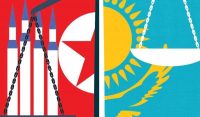
Elections in Kazakhstan Yield Results as Predicted
The highly-controlled elections to Kazakhstan’s lower house of parliament (Majlis) have produced a distribution of seats almost identical to the previous parliament, with ruling party Nur Otan — still under the chairmanship of former president Nursultan Nazarbayev — remaining firmly in charge.
The elections were the first since 80-year-old Nazarbayev yielded his position after nearly 30 years in power to his own hand-picked successor Kassym-Zhomart Tokayev. The leadership’s need for control and wariness of electoral protests is unsurprising in light of the unusual spate of anti-government rallies that took place when Nazarbayev passed the presidential reins in 2019, and the recent post-election demonstrations in neighbouring Kyrgyzstan, Belarus, and Russia.… Seguir leyendo »







